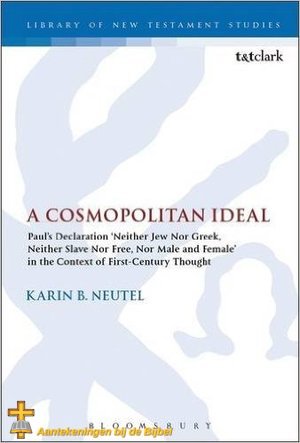
welke resulteren in allerlei aantekeningen.

What did Paul mean when he declared that there is 'neither Jew nor Greek, neither slave nor free, nor male and female' (Galatians 3:28)? While many modern readers understand these words as a statement about human equality, this study shows that it in fact reflects ancient ideas about an ideal or utopian community. With this declaration, Paul contributed to the cultural conversation of his time about such a community.
The three pairs that Paul brings together in this formula all played a role in first-century conceptions of what an ideal world would look like. Such conceptions were influenced by cosmopolitanism; the philosophical idea prevalent at the time, that all people were fundamentally connected and could all live in a unified society. Understanding Paul's thought in the context of these contemporary ideals helps to clarify his attitude towards each of the three pairs in his letters. Like other ancient utopian thinkers, Paul imagined the ideal community to be based on mutual dependence and egalitarian relationships.
| Titel | A Cosmopolitan Ideal Paul's Declaration 'Neither Jew nor Greek, Neither Slave nor Free, nor Male and Female' in the Context of First Century Thought |
| Auteur | Karin B. Neutel |
| Uitgever | Bloomsbury T&T Clark |
| Jaar Verschenen | 2015 |
| Taal | en |
| Pagina's | pp. 280 |
| ISBN13 | 9780567656834 |
| Onderwerp | Galaten (brief) |

Zie de huisregels welk commentaar wordt opgenomen!